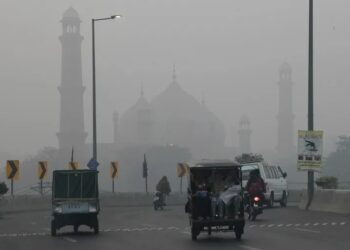Written By: Abdul Basit Alvi
On August 5, 2019, the Indian government, led by Prime Minister Narendra Modi and the Bharatiya Janata Party (BJP), revoked the special status of IIOJK by abrogating Article 370. This decision sparked widespread condemnation both within India and internationally. The move, carried out via a Presidential order and followed by a bill in Parliament, not only annulled Jammu and Kashmir’s autonomy but also divided the region into two separate Union Territories—Jammu and Kashmir, and Ladakh.
Critics, including legal experts, political leaders, and human rights organizations, have described the abrogation as unconstitutional and a violation of international law. Jammu and Kashmir remains a disputed territory under United Nations Security Council (UNSC) resolutions, which call for a plebiscite to determine the will of its people. By unilaterally altering the region’s status, the Indian government disregarded both the aspirations of the Kashmiri people and commitments made under international frameworks.
The revocation of Article 370 has also raised concerns about demographic changes. Following the decision, the Indian government permitted non-residents to purchase land and settle in the region—a shift perceived by people as an attempt to dilute the political and cultural identity of the indigenous Kashmiri Muslim population. While the government has promised economic growth and investment in the region, critics argue that the benefits are likely to favor newcomers rather than the local communities. This has led to accusations of “settler colonialism,” with fears that the native population could be reduced to a minority in their own homeland.
In the aftermath of the abrogation, Jammu and Kashmir was subjected to an intense security lockdown. Communications were suspended—including internet services, phone lines, and media access—while thousands of political leaders and activists, particularly those advocating for independence, were detained or placed under house arrest. The region witnessed a significant increase in military deployment, further intensifying an already highly militarized environment. This crackdown has led to serious human rights concerns, as residents have been subjected to extensive surveillance, restrictions on civil liberties, and an atmosphere of widespread fear and repression. The prolonged suspension of communication services and severe restrictions on freedom of movement have further isolated the people of Kashmir, deepening the region’s ongoing humanitarian crisis. India’s revocation of Article 370 has drawn significant international criticism. Pakistan has strongly condemned the move, labeling it a breach of international law and a violation of United Nations Security Council resolutions concerning Kashmir. Human rights organizations, including Amnesty International and Human Rights Watch, have strongly criticized India’s human rights record in Jammu and Kashmir. These organizations have called for independent investigations into the ongoing allegations of abuses and atrocities committed by Indian security forces.
In contrast, Azad Jammu and Kashmir (AJK), located in the northwestern region of Pakistan, holds substantial political, strategic, cultural, and emotional significance for the country. It reflects not only Pakistan’s enduring historical ties to the Kashmir issue but also embodies the aspirations of the Kashmiri people for self-determination. As a key component of the broader Jammu and Kashmir dispute with India, AJK plays a vital role in shaping Pakistan’s foreign policy, particularly regarding its stance on the Kashmir conflict.
The strategic relevance of AJK is multifaceted. Geographically, it shares a long and sensitive border with IIOJK, one of the most militarized and contested areas globally. AJK represents Pakistan’s steadfast support for the Kashmiri people’s right to self-determination—a position the country has upheld since the partition of British India in 1947, when the princely state of Jammu and Kashmir was divided between India and Pakistan. For many, AJK stands as a symbol of this unwavering commitment. The people of AJK view themselves as aligned with the broader Kashmiri population in their pursuit of independence and eventual reunification with Pakistan through a United Nations-mandated plebiscite.
Strategically located along Pakistan’s northern frontier, AJK plays a critical role in national defense. Its proximity to the Line of Control (LoC)—the de facto boundary separating AJK and IIOJK—adds to its military importance. The region’s rugged terrain, encompassing areas like Muzaffarabad, Neelum Valley, and Rawalakot, offers natural defense advantages and functions as a buffer zone against potential aggression from the east. This significance is underscored by the frequent skirmishes and conflicts between India and Pakistan over the years, reinforcing AJK’s role in Pakistan’s defense infrastructure.
Moreover, AJK holds importance in Pakistan’s broader strategic calculus due to its location near essential military routes and airspace corridors. It is also rich in water resources, home to major rivers like the Neelum and Jhelum, which are crucial for Pakistan’s water security. The region has significant hydroelectric potential, with major projects such as the Mangla Dam contributing to the national power grid and supporting the agriculture and energy sectors. These projects are integral to Pakistan’s economic development.
Azad Jammu and Kashmir also enjoys a unique constitutional and administrative status within Pakistan, rooted in the historical and political context of the Kashmir dispute. Unlike other provinces, AJK operates under a separate autonomous governance framework, distinct from the federal system, reflecting its special position in the unresolved status of the wider Jammu and Kashmir region. The political framework of Azad Jammu and Kashmir (AJK) is structured to reflect its unique status as part of a disputed territory. AJK operates under its own constitution, enacted in 1974, and maintains a separate legislative body known as the Azad Jammu and Kashmir Legislative Assembly. This assembly comprises elected representatives from the region and is responsible for enacting laws tailored to the specific needs of AJK. The political leadership of Azad Jammu and Kashmir (AJK) operates under a system where the Prime Minister serves as the chief executive, while the President functions as the ceremonial head of state. The government of Pakistan retains authority over key areas such as foreign affairs, defense, and communication. Administrative oversight of AJK is managed by Pakistan’s Ministry of Kashmir Affairs and Gilgit-Baltistan, ensuring alignment with Pakistan’s broader policy on the Kashmir issue and its diplomatic stance toward India.
AJK has its own judiciary, including a Supreme Court and High Court, which serve as the highest legal authorities in the region. This legal and political autonomy allows AJK to maintain independent governance systems that cater to the specific needs of its population.
Despite its status as a disputed territory, Azad Jammu and Kashmir enjoys a range of civil and political freedoms, which are both a reflection of Pakistan’s constitutional principles and a result of the region’s distinct standing within the country. Unlike IIOJK, AJK operates under an autonomous governance model that upholds key democratic rights. Citizens have the right to vote in regular elections and to elect representatives to the Azad Jammu and Kashmir Legislative Assembly. These democratic processes enable the local population to actively participate in shaping regional policies.
Elected leaders from AJK play a crucial role in advocating for the rights and aspirations of the Kashmiri people, both within Pakistan and on international platforms. Although AJK’s foreign representation is integrated into Pakistan’s foreign policy framework, its political figures are often consulted and included in national events, with their perspectives on the Kashmir conflict taken into serious consideration.
In comparison to IIOJK, AJK is recognized for its relatively greater political freedom. Residents enjoy the rights to freedom of expression, peaceful assembly, and association. Political parties, civil society organizations, and activist groups are able to operate without the restrictions often reported in Indian-controlled Kashmir. AJK also hosts a vibrant civil society, including women’s rights organizations, environmental advocates, and media outlets that actively engage in regional development, governance, and social issues.
Religious freedom is another hallmark of life in AJK. The region is home to diverse religious communities that coexist peacefully. Religious festivals are celebrated openly, and interfaith harmony is a defining feature of AJK’s social fabric.
Pakistan has made significant contributions to the development of Azad Jammu and Kashmir, particularly in sectors such as infrastructure, education, and healthcare. Since AJK’s inception, the federal government has invested in expanding and modernizing the region’s infrastructure. Projects include the construction and improvement of roads, bridges, and highways to enhance connectivity with other parts of Pakistan, supporting both economic activity and daily life.
Among the most notable development initiatives is the Mangla Dam, one of Pakistan’s largest hydroelectric and irrigation projects. Situated near AJK, the dam provides electricity, supports agriculture, and plays a vital role in water storage for the region and beyond.
Pakistan has also prioritized access to education and healthcare in AJK. Over the years, numerous schools, colleges, and universities have been established, providing educational opportunities to the region’s youth. Additionally, investments in healthcare have improved medical services, ensuring better access to treatment and facilities for residents. Prominent educational institutions such as Allama Iqbal Open University (AIOU) and the University of Azad Jammu and Kashmir (UAJK) play a significant role in advancing the intellectual and professional growth of the region. The federal government has also extended support to healthcare services in AJK by establishing hospitals, clinics, and health centers that cater to the needs of the local population. In addition, Pakistan has provided humanitarian assistance to the region, particularly during natural disasters such as earthquakes, which have had a considerable impact on AJK over the years. Pakistan has undertaken significant efforts to enhance the economic development of Azad Jammu and Kashmir (AJK) through a range of support programs. Financial assistance has been directed toward key sectors such as agriculture, energy, and industry. The government has also bolstered local industries by offering subsidies, improving infrastructure, and facilitating access to markets. In times of natural disasters—most notably the devastating 2005 earthquake—Pakistan has consistently provided timely humanitarian aid. The Pakistani military, along with various humanitarian organizations, played a critical role in delivering emergency relief, medical assistance, food, and shelter to the affected communities, ensuring swift recovery and rehabilitation efforts.
While both India and Pakistan hold opposing views on the Kashmir conflict, their respective approaches have differed dramatically over time. India’s handling of the issue has been marked by a series of actions and policies that have not only contravened international norms and human rights conventions but have also intensified the suffering of the Kashmiri people. Driven largely by political and territorial interests, India’s reluctance to address the legitimate grievances of Kashmiris has deepened the crisis and prolonged the conflict.
IIIOJK has become one of the most militarized regions in the world, with hundreds of thousands of troops deployed since 1947. This overwhelming military presence has led to numerous reports of human rights violations, including extrajudicial killings, enforced disappearances, torture, and excessive use of force against civilians and peaceful demonstrators. A particularly controversial element of India’s security policy is the Armed Forces Special Powers Act (AFSPA), which grants sweeping powers to the military, including the authority to arrest or kill with near-total impunity. Enacted in the early 1990s, AFSPA has enabled systemic abuses, often without accountability or recourse for victims.
In contrast, Pakistan has maintained a principled and peaceful stance on the Kashmir issue, consistently advocating for diplomacy, dialogue, and adherence to international law. Pakistan’s position has centered on supporting the Kashmiri people’s right to self-determination and calling for a peaceful, negotiated resolution that aligns with their aspirations.
Since the beginning of the conflict, Pakistan has actively raised the Kashmir issue at international platforms, including the United Nations and the Organization of Islamic Cooperation (OIC). Through persistent diplomatic engagement, Pakistan has succeeded in internationalizing the Kashmir dispute and drawing attention to the human rights situation in IIOJK. The country has repeatedly called for a UN-backed plebiscite to allow the people of Jammu and Kashmir to decide their own future, in line with UN Security Council resolutions. Furthermore, Pakistan has appealed to major global powers—such as the United States, China, and European nations—to pressure India into upholding international human rights standards and respecting the will of the Kashmiri people. Pakistan has consistently extended political and moral support to the people of Jammu and Kashmir. It has backed political leaders and parties in Azad Jammu and Kashmir (AJK) who represent and advocate for the aspirations of the Kashmiri people. The leadership in AJK, an autonomous region within Pakistan, has regularly expressed solidarity with those living in IIOJK. In times of crisis—such as natural disasters or periods of intensified military crackdowns—Pakistan has provided humanitarian assistance to the residents of Indian Illegally Occupied Jammu and Kashmir (IIOJK). Additionally, Pakistan has supported refugees fleeing violence in IIOJK by offering shelter and aid in AJK. To raise awareness about the Kashmir issue, Pakistan has actively promoted public campaigns at both national and international levels, aiming to keep global attention focused on the plight and rights of the Kashmiri people. These awareness campaigns have played a vital role in generating both national and international support for the Kashmiri cause and in expressing solidarity with the people of Jammu and Kashmir. Pakistan has consistently maintained that the Kashmir dispute must be resolved through peaceful means, in accordance with the will of the Kashmiri people. In contrast to India’s militarized approach, Pakistan has advocated for a diplomatic solution through dialogue involving Pakistan, India, and the Kashmiri leadership.
Pakistan has repeatedly extended invitations for negotiations with India and has welcomed the involvement of international mediators to help resolve the conflict. Even in the face of continued refusals from India, Pakistan’s commitment to peaceful engagement remains firm. It has urged India to demilitarize the region, uphold the fundamental human rights of the Kashmiri people, and allow them the freedom to determine their own future.
Pakistan has also stressed the importance of preserving the cultural and religious identity of Kashmir, especially in light of India’s attempts to alter the demographic composition of IIOJK. The government of Pakistan strongly opposes the settlement of non-Kashmiris in the region, viewing such actions as efforts to dilute the Kashmiri Muslim identity—an identity central to the struggle for self-determination.
Moreover, Pakistan has consistently drawn international attention to the ongoing human rights violations in Indian Illegally Occupied Jammu and Kashmir (IIOJK). It has urged organizations such as Amnesty International, Human Rights Watch, and others to investigate and report on the abuses committed in the region. By keeping the spotlight on these violations, Pakistan seeks to ensure that the suffering of Kashmiris is neither ignored nor forgotten by the global community.
The Line of Control (LoC), a key flashpoint in the Kashmir conflict, serves as the de facto boundary between Azad Jammu and Kashmir (AJK) and Indian Illegally Occupied Jammu and Kashmir (IIOJK). While it marks the military division between the two sides, it is not recognized as an international border. The LoC is a product of the unresolved status of Jammu and Kashmir and remains a symbol of the ongoing dispute.
One notable aspect of the LoC is Pakistan’s decision not to fortify it with fences or barriers, unlike India, which has heavily militarized and physically reinforced its side of the border. Pakistan’s choice to leave the LoC unfenced reflects not an absence of security concerns, but rather a principled stance rooted in international law, the United Nations resolutions on Kashmir, and its commitment to a peaceful and just resolution of the conflict.
The Line of Control was formally established following the 1972 Simla Agreement, signed by India and Pakistan after the 1971 war that led to the creation of Bangladesh. The agreement designated the LoC as a temporary arrangement pending the final resolution of the Kashmir dispute. Both parties agreed not to alter the status of the region unilaterally or by force, acknowledging that the issue remained unresolved. Since then, the LoC has served as the effective, though unofficial, line separating AJK and IIOJK, symbolizing both the enduring conflict and the continuing hope for a diplomatic settlement. Pakistan’s decision not to fence the Line of Control (LoC) distinctly contrasts with India’s approach, which involves extensive fortification and security measures along its side of the border. This difference reflects the core of Pakistan’s position on the Kashmir conflict—namely, the recognition that Jammu and Kashmir is a disputed territory whose status remains unresolved.
The roots of the Kashmir dispute date back to the 1947 partition of British India, when the princely state of Jammu and Kashmir—despite having a Muslim-majority population—acceded to India. This decision, made by the Hindu Maharaja against the will of the majority population and neighboring Muslim regions, sparked strong opposition and led to the first war between India and Pakistan in 1947–1948. The conflict concluded with a United Nations-brokered ceasefire, which left the region divided and the dispute unresolved. Since its inception, the Kashmir dispute has remained a central issue in the bilateral relationship between India and Pakistan. The region’s final status continues to be unresolved, with both countries asserting claims over its entirety. Pakistan has consistently maintained that Jammu and Kashmir is a disputed territory, and its future should be determined by the people of Kashmir, in accordance with United Nations Security Council resolutions. Among the most significant is Resolution 47 (1948), which explicitly calls for a plebiscite to allow the people of Jammu and Kashmir to decide whether to accede to India or join Pakistan.
Pakistan’s stance is firmly grounded in the internationally recognized principle of self-determination, enshrined in the UN Charter and other global human rights instruments. According to this principle, all peoples have the right to freely determine their political status and to pursue their economic, social, and cultural development. Pakistan believes that, given their unique historical, cultural, and demographic identity, the Kashmiri people must be granted the opportunity to exercise this right free from coercion or external pressure.
In this context, Pakistan’s decision not to erect a fence along the Line of Control (LoC) carries symbolic and diplomatic weight. This policy aligns with its commitment to the Simla Agreement of 1972, which established the LoC as a temporary arrangement pending the final settlement of the Kashmir issue. Under the agreement, both India and Pakistan pledged not to alter the status of the region unilaterally or by force. By refraining from fortifying the LoC, Pakistan underscores its respect for the agreement and its broader commitment to diplomacy and peaceful coexistence.
Pakistan’s choice also reflects its consistent call for dialogue and peaceful resolution of the dispute. Unlike India’s heavily militarized approach—which includes constructing extensive fencing and security installations along the LoC—Pakistan’s approach leaves space for the potential of cross-border interaction, trade, and people-to-people exchanges. Such openness fosters trust, facilitates humanitarian cooperation, and keeps the door open for negotiations. In contrast, India’s fencing of the LoC has further entrenched divisions, restricted civilian movement, and contributed to a worsening humanitarian situation in border areas.
From a humanitarian perspective, Pakistan’s policy also seeks to minimize the impact on communities living along the LoC. Many families reside in these border regions, and the construction of a fence would disrupt their livelihoods and social fabric. Limited yet vital cross-border movement—whether for trade, communication, or family connections—helps to alleviate some of the hardships these communities face. Maintaining an unfenced LoC thus demonstrates Pakistan’s sensitivity to the humanitarian needs of the population on both sides of the divide.
By refusing to fortify the LoC, Pakistan sends a clear message that it does not accept the status quo as final or legitimate. It reaffirms its position that Jammu and Kashmir is not an integral part of India, and that any lasting solution must come through a democratic process guided by international law and UN resolutions. Fencing the LoC, in contrast, would suggest an acceptance of a permanent division—something Pakistan fundamentally rejects in favor of a just and peaceful settlement rooted in the will of the Kashmiri people. The decision not to fence the LoC underscores Pakistan’s commitment to the belief that Kashmiris should have the opportunity to exercise their right to self-determination in the future, as enshrined in international law. In contrast, India’s construction of a fence along the LoC clearly reflects its intentions to move towards the integration of Indian-Occupied Jammu and Kashmir (IIOJK) into India, disregarding the will of the Kashmiri people and violating UN resolutions. This difference in approach highlights the contrasting positions of India and Pakistan on the Kashmir issue. While Pakistan does not recognize the LoC as a permanent border and remains steadfast in its support for the Kashmir cause and UN resolutions, India’s actions suggest a clear intent to solidify its control over the region. India’s approach stands in stark contrast, as evidenced by the reprehensible act of constructing a fence along the LoC.
This clear divergence in the approaches of Pakistan and India should serve as a wake-up call for those who claim to advocate for independence or harbor anti-Pakistan sentiments. Pakistan has consistently demonstrated unwavering support for the Kashmiri people and the Kashmir cause. It is now essential to put aside political differences and work together under the banner of Pakistan to resolve the Kashmir issue. The first and most critical step is to compel India to grant Kashmiris their right to self-determination. Only after this fundamental step should other options be considered. Until then, all other alternatives and their promotion should be paused, and the focus should solely be on uniting under Pakistan’s leadership to push India to the negotiating table and grant Kashmiris their right to choose their future. This approach is the key to resolving the Kashmir issue. All stakeholders must work together, setting aside differences, to achieve a resolution.

























